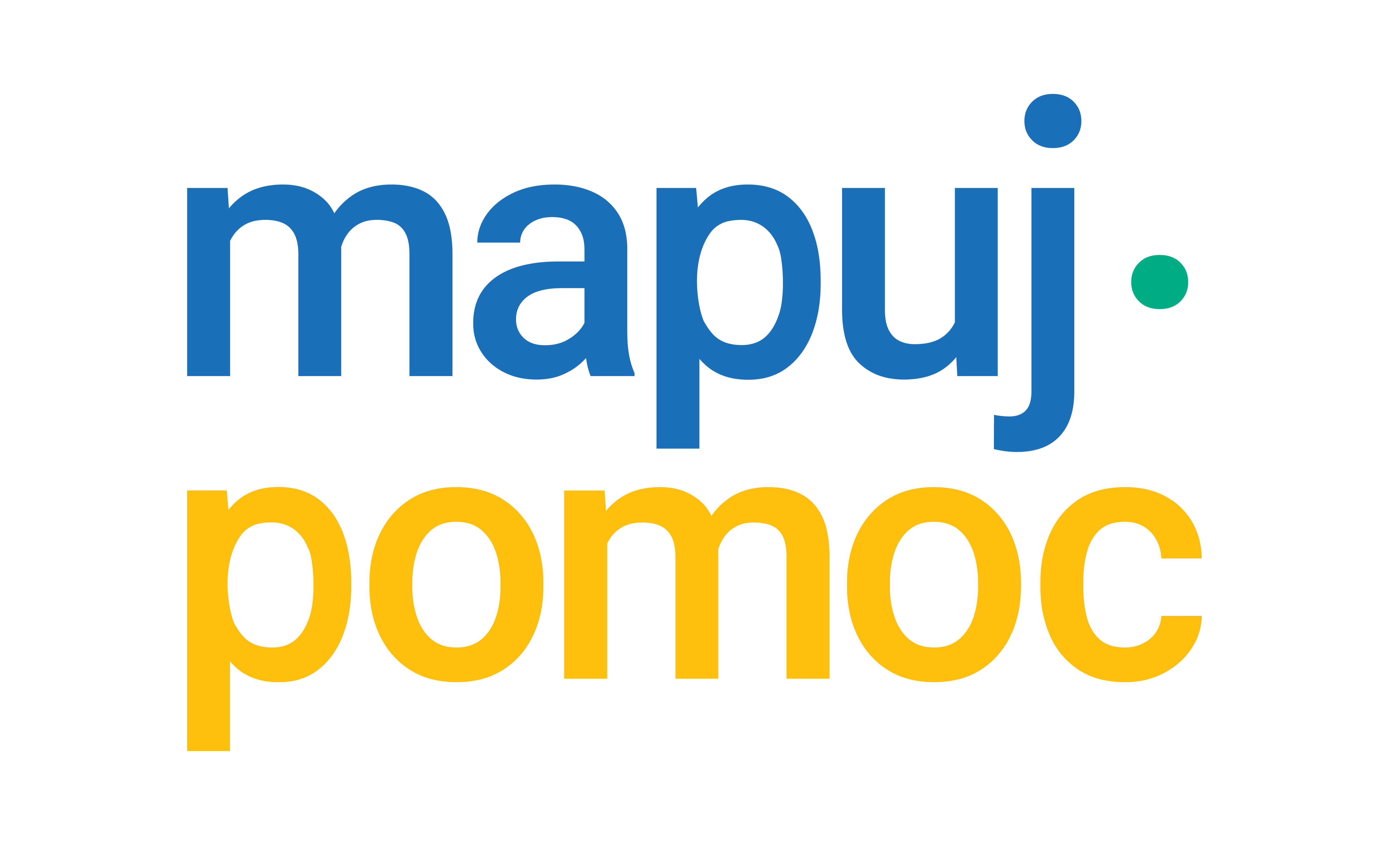From grassroots actions to the largest educational support program for Ukrainian citizens worth 22 million zlotys. At the University of Warsaw, you will find free support across 27 different actions: from language learning, psychological, legal, and professional support, to sightseeing trips.
In the headquarters of the staff involved in the “UW for Ukraine” program located at Dobra 55 street, it’s hard to find a person who doesn’t smile at the sight of another human being. This is where refugees from Ukraine come almost daily to choose the right offer for themselves from a broad spectrum of free classes, courses, and trips. All of this is made possible thanks to a team of male and female workers, as well as students operating under the guidance of Dr. Agnieszka Różycka, an economist, who secured substantial funds to aid Ukrainians of all ages. Altogether, it’s 22 million zlotys for various types of activities to be carried out until the end of 2023. Around 6,000 people will benefit from them. One of them might be the reader of this text, provided they have Ukrainian citizenship and arrived in Poland after February 23, 2022.
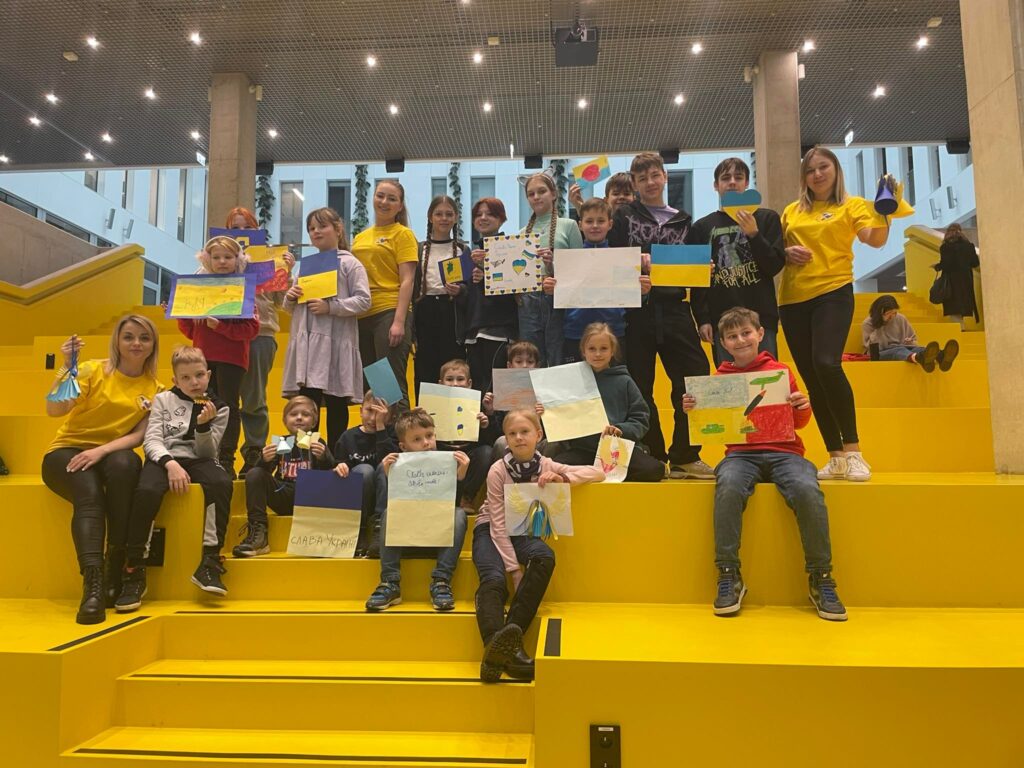

27 forms of support for refugees
Upon entering the “UW for Ukraine” office, you immediately feel a friendly disposition, warmth, and an atmosphere reminiscent of the comfort of home to which you return after long months of separation from family. When I visit, the duty is being held by Walery Nowicki, Joanna Pacholska, and Igor Novytskyy, who answer phone calls and emails from people interested in the university’s activities on behalf of refugees from Ukraine. Igor and Walery, in addition to their fluent knowledge of Polish, also speak Ukrainian and Russian fluently, so in the office, you can hear a combined melody of Slavic dialects. The on-duty staff provide information about the 27 forms of support offered by the “UW for Ukraine” program. These actions include language courses (Polish, English, French, Spanish, German, Italian, and even Chinese), career planning and professional activation workshops (including basic courses speeding up employment and development courses for highly qualified specialists), adaptive meetings (e.g., painting workshops, artistic and educational activities for children and entire families), psychological support, legal support, entrepreneurship classes, computer courses, acting theater workshops, short trips to interesting corners of Poland (e.g., Gdańsk, Kraków, National Parks), multi-generational adaptive city walks around Warsaw, film screenings, workshops on “how to learn effectively”, experimental natural science workshops, webinars supporting guardians, educators, and coaches involved in helping children from Ukraine, intensive courses preparing for studies or work in the Polish language, open lectures combined with workshops in various fields from history to physics. On top of this, there’s the Ukrainian choir led by Irina Bogdanovich. Every mentioned proposition is free of charge.
It’s impossible to list all the activities, as they directly stem from the needs reported by the refugees. Therefore, new ones are quickly added to the existing classes. That’s why it’s best to check the currently available offers on the website www.ua.wne.uw.edu.pl, where you can register for the chosen activity. It’s also worth joining the campaign’s Facebook profile, Instagram, or Telegram: t.me/UWdlaUkrainy. Activities in children and youth groups are also described on Facebook: www.facebook.com/uwdlaua.
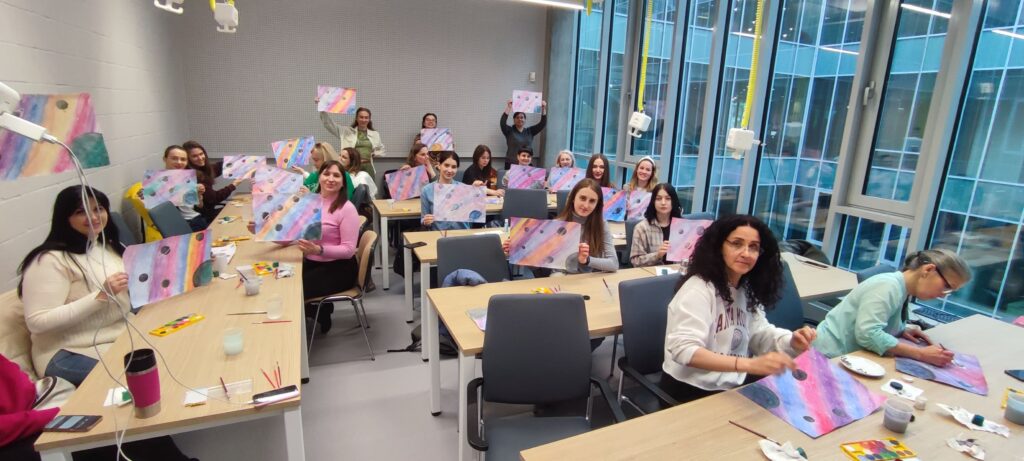
The largest educational support program
– The activities of UW are the largest educational support program for people from Ukraine implemented by a Polish university, both in terms of the number of offered activities and the value of the project, says Dr. Agnieszka Różycka from the Faculty of Economic Sciences at the University of Warsaw, head of the “University of Warsaw for Ukraine” program. Dr. Różycka recalls that many Polish universities have engaged in helping refugees – that’s why it’s worth checking what the university or academy near your place of residence offers. For those outside of Warsaw, however, all online classes offered by the “UW for Ukraine” program are directed.
Mariczka Bilostotska, as part of the “UW for Ukraine”, is learning Italian and participating in theater workshops.
– The acting workshops really help us in dealing with stress, says Mariczka. – During the first classes, we lay on the floor and our task was to express various emotions. We had to, for example, laugh, shout, and cry. It turned out that we really needed to release certain feelings that have accompanied us since leaving Ukraine. This experience united us as a group. Since then, we feel like a family, says the beneficiary of the university support program.
Such integration of compatriots abroad proves to be an invaluable value. Thanks to the workshops, Mariczka met new acquaintances and continues to stay in touch with them even outside of the classes.
– We also go together to performances at the Teatr Powszechny, where our lecturer performs, Mariczka recounts and adds that she also took part in online language group sessions.
Dzięki temu z warsztatów mogli skorzystać uchodźcy z różnych miejscowości. Internetowe spotkania umożliwiają też poznanie rodaków rozsianych po Polsce.
– The classes are conducted by lecturers from other universities across the country, says Mariczka. – My friends also take advantage of the ‘UW for Ukraine’ offering. They chose English and Spanish lessons, she lists and sincerely recommends taking advantage of the available meetings, even if just for integration purposes.
Economist-activist: how it all began
When the war broke out, Agnieszka Różycka’s first instinct was to go to the border with Ukraine, like many Poles who decided to help Ukrainians fleeing the war. This urge to help wasn’t something new for the economist. For years, she had been involved in initiatives as a volunteer, including in orphanages and senior homes. However, Agnieszka’s initial enthusiasm for the idea was cooled by her father, who reminded her that as a lecturer and mother of four children, she needs to take a broader look at the problem and try to use her intellectual and organizational potential to create support that will impact a larger group of people.
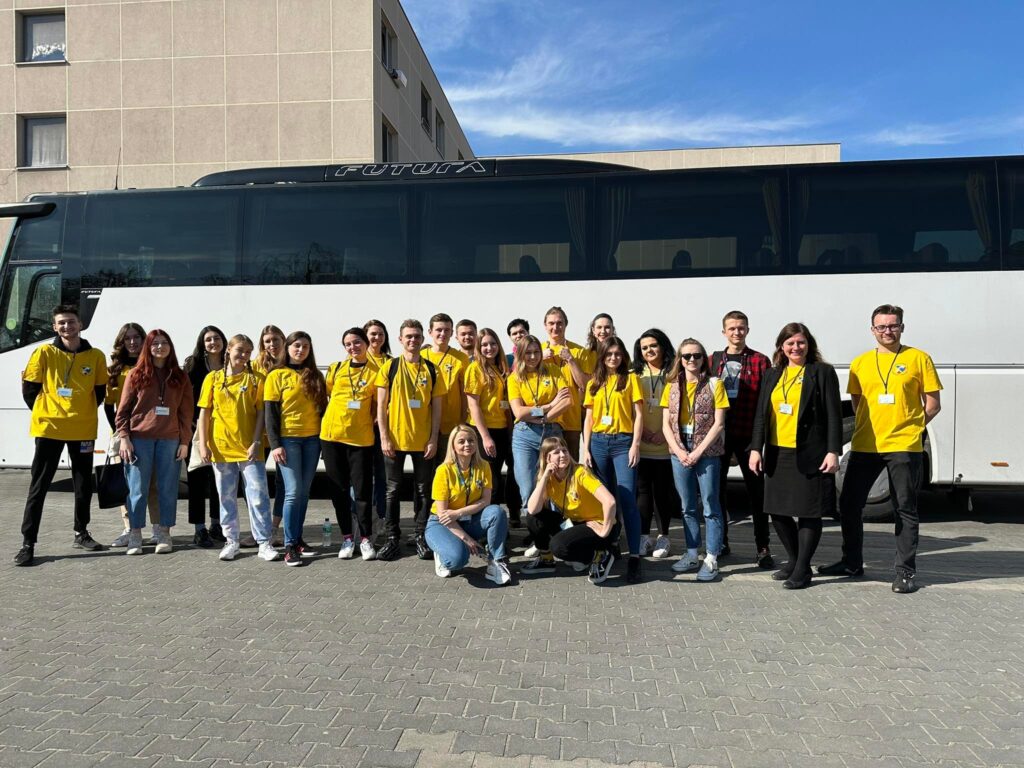
Initially, she tried to find external funding for her action ideas aimed at children and youth from Ukraine, applying for support from foundations or banks. However, the discussions were prolonged, and during this time, the National Centre for Research and Development allowed universities to allocate funds saved from other projects to help Ukrainians.
Agnieszka Różycka, even before the war, led a support project called “The Third Mission of UW” executed under the Operational Program Knowledge Education Development – its value was set at 2.5 million PLN. The ultimate goal was to provide educational assistance to individuals not affiliated with the university.
At the University of Warsaw, many individuals and groups offered their assistance to people fleeing from armed attacks. Initiatives emerged from both students and lecturers, practically from every faculty at the UW. Various forms of help provided by different individuals and groups from UW were gathered, coordinated, and incorporated into a comprehensive support program “University of Warsaw for Ukraine.”
We took advantage of the opportunity offered by the NCRD (National Centre for Research and Development) and expanded the funding. Soon, using European Funds, we managed to secure additional resources, reaching the amount of 15 million zlotys, Dr. Różycka says with evident pride.
Program for Ukrainians of all ages
The initial offer directed at people from Ukraine encompassed 19 different activities, conducted in collaboration with employees from 15 units of the University of Warsaw (UW), coordinated by the Faculty of Economic Sciences at UW, which is Dr. Różycka’s home unit. The Faculty of Psychology offered webinars, psychological workshops, and individual psychological consultations; the Faculty of Modern Languages proposed language courses and conversational sessions; the Open University expressed the desire to coordinate Polish language courses, educational walks around Warsaw, and open lectures.

It quickly became evident that Ukrainian children and teenagers attending adaptive sessions were often accompanied by younger parents or grandparents. Dr. Różycka recalls an instance where a grandmother came to a painting workshop with her grandson. Initially, she was just there to accompany him, but she soon picked up a brush and painted her own piece. The relief on her face, the joy, and the visibly reduced stress served as a trigger for the project coordinator. In that moment, she realized that the assistance in the form of adaptive and educational activities also needed to be directed towards the elderly and other age groups.
Additionally, students and representatives from other UW units approached Dr. Różycka with further support proposals. There were so many initiatives that the list of offerings for refugees continued to expand. An interesting solution for UW students turned out to be a university-wide subject that enabled assisting refugees using the “UW for Ukraine” program as part of their curriculum. Students earn ECTS points for such engagement, so the course counts towards the program they are pursuing during their studies. This idea proved to be a perfect fit, as students could propose their assistance ideas and also participate in already ongoing programs.
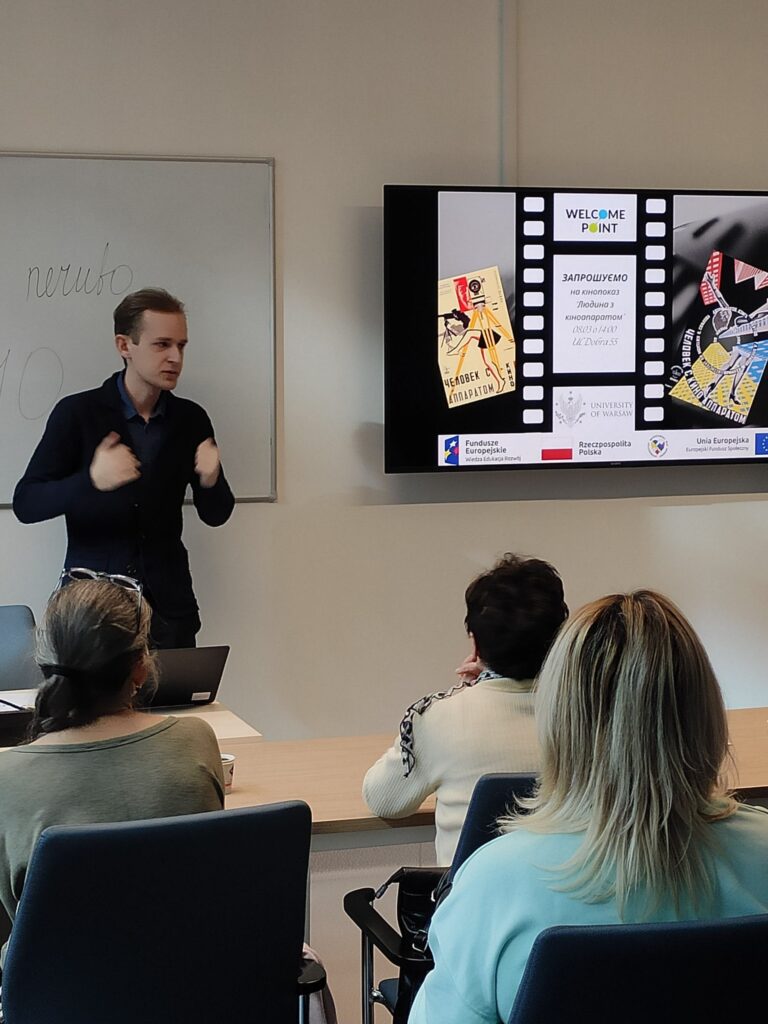
One of them is Kamil Dziuba, a first-year master’s student in journalism.
– I felt that I wasn’t active enough in this matter. From the beginning of the war, I wanted to get involved in helping refugees and I’m glad that the university gave me such an opportunity, says Kamil Dziuba. – Besides, I believe that journalists should be socially engaged. We proposed a movie review for children. Another group prepared crocheting workshops for them, he narrates.
As Kamil explains, volunteering brought him closer to the Ukrainian community, and at the same time, he met wonderful peers working within the university-wide course. For him, it’s a lesson in solidarity, but also in creative problem-solving. Recently, when they were preparing popcorn for young viewers, they discovered they had bought the kernel type, not suitable for microwaving. So, they decided to pour the corn into paper bags sealed with tape. Fortunately, the operation was successful, and the children received their salty snack.
– I feel that I’m doing something important for the children from Ukraine. You can see how they open up during these workshops. Initially quiet and shy, later they are laughing and full of energy. The mere fact that they come back to us means a lot to us, Kamil explains.
Actions arising from the needs of refugees
Among students like Kamil, there were those who became so involved in the project that they were hired full-time by Dr. Różycka. Volunteers are the foundation of the entire support program, but for such large initiatives, full-time employees are also needed. They describe themselves as a family, which accurately captures the atmosphere at Dobra 55. And the healthy relationships between them are of value to the refugees, who often seek that homely atmosphere after being forced to leave their cities and villages.
– We’ve had mothers come to us who’ve experienced traumatic moments, watching helplessly as their children or family members were wounded by shrapnel. They didn’t know how to help. That’s why we’ve also planned workshops on providing pre-medical first aid. The interest is substantial, adds Agnieszka Różycka.
Once, a Ukrainian grandmother with two grandchildren came to the facility at Dobra 55. Unfortunately, due to their challenging financial situation, they were confined for many months in a rented attic room. The grandmother learned about the free classes at UW. When the children, after being isolated from their peers for a long time, showed up at the “UW for Ukraine” headquarters, it turned out they couldn’t read or write.
– Our animators work with them on the Ukrainian and Polish alphabets during educational games, even though there isn’t a specific activity like that in the program. We try to adapt to the needs of the refugees, explains Dr. Różycka.
When it was discovered that among the refugees there were individuals experiencing domestic violence, workshops were organized. Here they discussed various forms of family violence (mental, physical, economic) as well as the possibility of their legal evaluation. Workshop participants could also learn about support options for victims of violence, including the Blue Card procedure and the isolation of the perpetrator of violence (both within criminal proceedings and outside them).
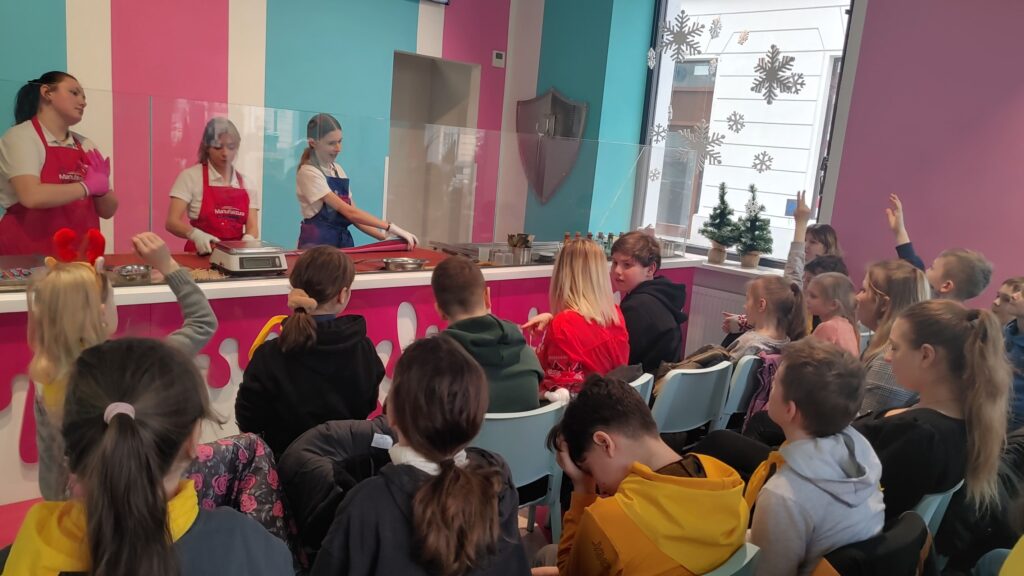
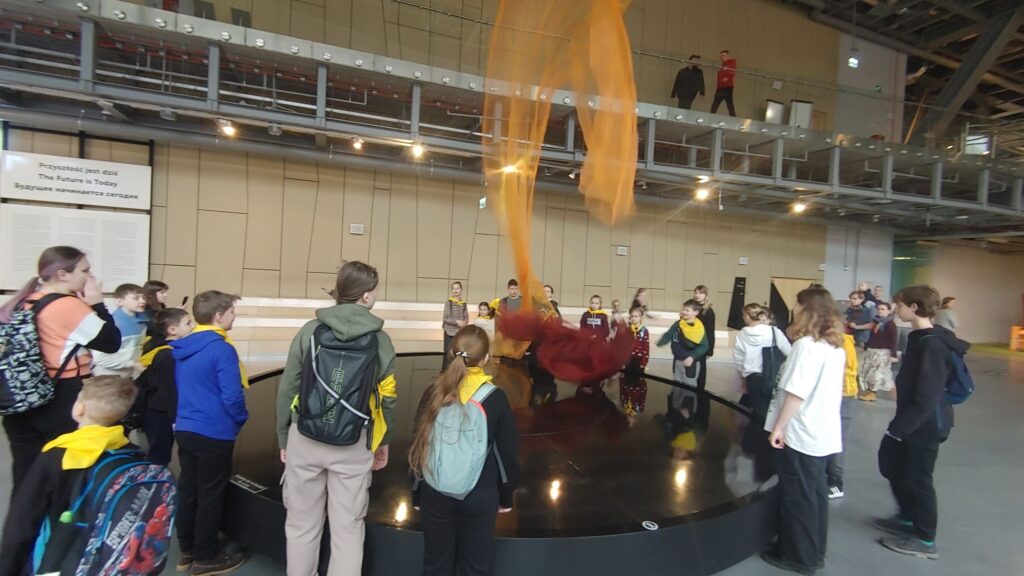
Find a job at the University of Warsaw
that language courses are of the greatest interest. After the outbreak of the war, the university proposed 10 Polish language courses, and the need was immense. Thanks to the expanded funding by Dr. Różycka, it was possible to plan 130 such groups (and there will probably be more). These are courses for people of various ages.
Many educational meetings primarily aim to raise the qualifications of refugees to increase their chances of finding employment in Poland. In these classes, Ukrainians learn the skills often required by Polish employers. A computer course will provide knowledge of Excel or other programs needed for office work. For those who are more specialized, there are vocational training or consultations with a career counselor.
There are so many activities that Dr. Różycka has to expand the team of permanent office employees from time to time. Currently, there are eight of them, and over two hundred people are employed in the project in total (mainly trainers, counselors, animators). As the economist recounts, candidates for office jobs are invited (right after the qualification interview) to briefly engage in group activities. The idea is for them to see how work is done in this place.
Liliia has recently been working at Dobra 55. Shortly after the qualification interview, following the request of her potential boss, she joined the team and, after a few hours of voluntary work, declared that she would also show up the next morning.
– When I said that I hadn’t finished the recruitment process yet, so I couldn’t guarantee employment, Lila replied that she would come the next day regardless of whether she gets the job, recalls the coordinator. – “I’ll come because I see that you need help,” she added and emphasized how important it is for her to support her compatriots at such a difficult moment in their lives. – It’s no surprise that Lila joined the team.
There are many touching moments around the activities of the “UW for Ukraine” team, unexpected heart gestures, or joint actions to organize help in a specific need.
– If out of these 6,000 target beneficiaries even 10 people say that our actions helped them find their way in this difficult situation, cope with trauma or find a job, I will be sure that it was worth organizing this help. This project gives us a sense of life’s purpose, summarizes the coordinator.
Dr. Agata Opolska-Bielańska supports Agnieszka Różycka in coordinating the project. She sees that the time in which people from Ukraine find themselves is very challenging and brings a lot of uncertainty, but she also sees an opportunity for something new in it.
– This can become a new experience and an opportunity for development in a different life space. It’s worth seeking support to turn a difficult moment into self-development. Here works a qualified staff, with a vision of the future and great motivation to help. Additionally, the University of Warsaw is recognized worldwide; it’s worth building your CV with it, she reminds, purely practically, and ends her statement with an appeal:
– Jesteśmy tu dla Ciebie! Mamy doświadczenie w udzielaniu pomocy. Nie może Cię tu zabraknąć. Przyjdź, poznaj i pozostań!
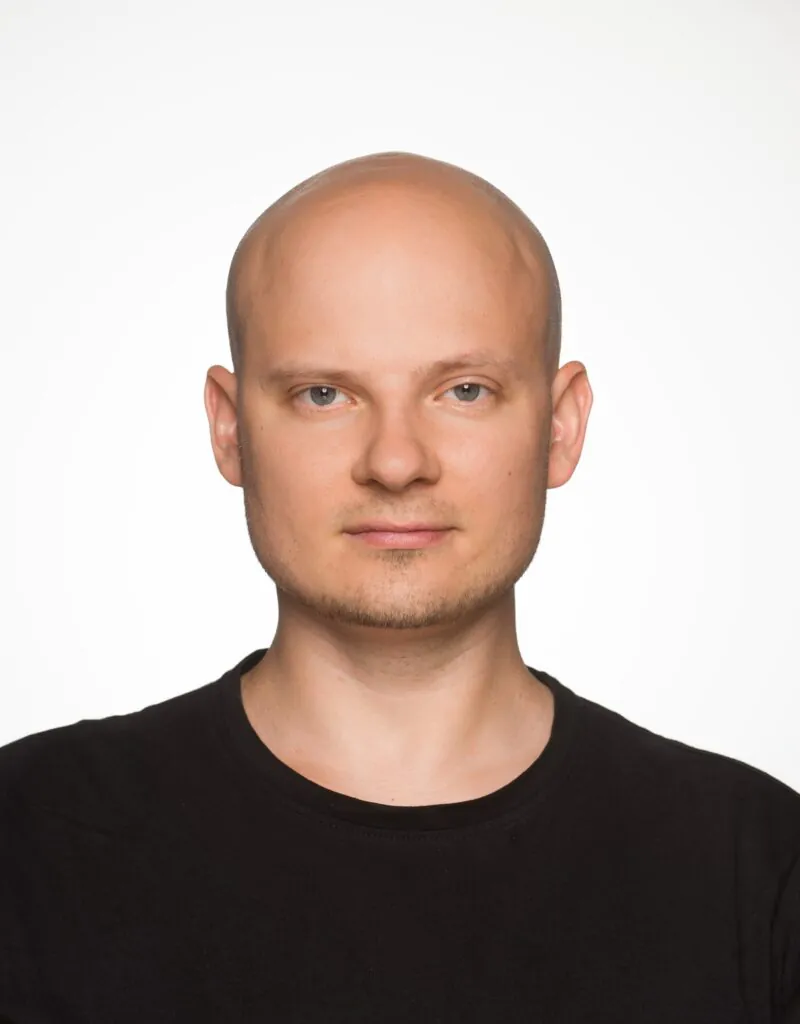
AUTOR
Wiktor Cyrny – journalist, reporter, researcher, and lecturer at the University of Warsaw, game scriptwriter. He has been involved with the topic of migration since 2015. As a reporter, he worked in refugee camps in Africa, Asia, and Europe. He published in outlets like “Newsweek”, “Krytyka Polityczna”, “Gazeta Wyborcza”, “Wprost”, Holistic.news. He is the creator of documentary films for Canal+Discovery, Canal+Documentary, Travel Channel, Via Play. For his reports, he received awards including from the US Embassy (twice, in 2012 and 2013). He holds dual master’s degrees from the University of Warsaw in Documentary Film (MISH) and Journalism. His three biggest passions are: reading, writing, and traveling – best when combined.
